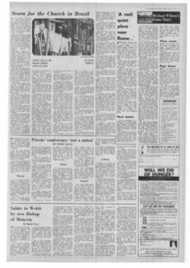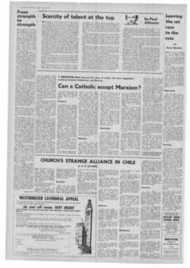Page 6, 28th July 1972
Page 6

Report an error
Noticed an error on this page?If you've noticed an error in this article please click here to report it.
Tags
Share
Related articles
Richard Attenborough's Quest For Mahatma Gandhi
A Triumphant Portrait Of Gandhi
Bull , S - Eye On A Sacred Cow
Attenborough Triumph
`hail Mary' On The Way Into Battle
Many-faceted portrait of a great man's youth
IT was bold of Richard Attenborough, the director, and Carl Foreman, producer and author of Young Winston ("A," Odeon Leicester Square and Leicester Square Theatre) to attempt a lifelike portrait of a man whose image is still as vivid and dominant in many of our memories as Churchill's.
Their courage should be rewarded. In my opinion they have made a film at least as brilliant and much more likeable than "Oh! What a Lovely War," Attenborough's triumphant debut as a director.
They have given us a manyfaceted portrait composed from various viewpoints. First there is the story, based on Churchill's own story "My Early Life": from the balcony of Buckingham Palace the Churchill of the newsreels and the war years flashes back to look on himself when young.
We look with him at the young warrior on a white horse in India (Simon Ward) and back to the childhood of the lonely little boy who loathed school, saw too little of his brilliant parents. Lord and Lady Randolph Churchill (Robert Shaw and Anne Bancroft) and adored the Nanny he called "Womany." before we get to the slip of a beautiful boy it was always surprising to learn from photographs that Churchill had been.
The youth was not thought bright enough for anything but
the Army, and even then he had to sit the examination three times before passing into Sandhurst and on to his adventures in the Sudan (taking part in the last full cavalry charge by any British regiment) and the Boer War before he reached Parliament.
Absorbing as the history is in its own right, the film keeps the modern spectator in perspective by the clever device of having Churchill's voice reading extracts from his book to comment (often with characteristic self-mockery) and alert as to the hints in the ruthless resourceful boy of the genius and historic national hero he valid become.
Simon Ward's startling success in evoking the familiar fruity Churchillian tones in these extracts carries off this daring device which at first threatens to seem just a distracting trick. I have more reservations about the other device of an anonymous interviewer in the anachronistic and impertinent television style.
The casting throughout seems miraculous. Young Simon Ward triumphs at every stage from the golden boy with an incipient bulldog jaw and reckless sanity who incredibly blossoms into the authority and fire of the young M.P.'s maiden speech in defence of his father,
Robert Shaw is always a gifted actor. but I have never liked him so well as in the role of Lord Randolph Churchill, the clumsy, uncommunicative father, the brilliant politician whose final collapse is total. Anne Bancroft, too, makes perfectly understandable Attenborough's insistence in persuading her that she would be perfect as Jennie Jerome, Winston's glamorous American mother.
Even tiny parts in the hands of this long distinguished cast provide moments of brilliance, such as Ian Holm's editor of the Times, Anthony Hopkins's fierce twinkle as Lloyd George who first recognised in Winston a kindred spirit, and Robert Flemyng's intense integrity as the specialist who breaks the appalling news of Lord Randolph's fatal illness to his wife.
Two little boys who play still younger Winstons (aged seven and 13) also contribute decisive touches of character to what could well become the prelude to a definitive later portrait of the whole man.
For the present Richard Attenborough has done a masterly job of co-ordinating and conducting his very complex material soberly, sympathetically and smoothly to compose a portrait in something like a new dimension which leaves us with the Churchill the public knew.
Having been moved to tears and smiles and pride, I should have thought "Young Winston" a film everybody would want to see and nearly everybody would enjoy.
Everybody who can stand the noise of the Arizona annual frontier days rodeo, and who doesn't mind about the bulls (and cows in a hectic milking race), will also probably enjoy Junior Bonner ("A," Astoria)
and find it exhilarating entertainment.
Junior (Steve McQueen) arriving to take part in the great garish rodeo finds his whole family there. His ex-rodeo champion father, an incurable optimist dreaming of Australia, is played by Robert Preston with down-at-heel panache.
His brother Curly settles for hard cash. Their mother, tired of caring for drifters and dreamers, is played by Ida Lupino with the right nostalgia from backstage shows, which this essentially is.
Sam Peckinpah has directed the whole rumbustious spectacle with his usual vigour but also with heart.
Henry VIII and his Six Wives ("A." ABC-2, Shaftesbury Avenue) is not in fact a run-together version of the successful television series, but it might almost as well be so. Concentration of interest has shifted from the wives to Henry; and an attempt is made to present him as almost more sinned against than sinning, and virtually forced by his political advisers and interests to carry on marrying.
Keith Michell repeats, or rather renews, his splendid performance as Henry in the full-length film. But although compassion may be prompted by the disappointment of his golden promise, the arguments for Henry are difficult to sustain, and with interest spread thinner over the chorus of wives the result is in danger of dullness.
Frances Cuka's Catherine of Aragon I thought much the best of the six new wives, though Charlotte Rampling tries to do something for Ann Boleyn.
Bernard Hepton's Cranmer is only too convincing; Donald Pleasence's Thomas Cromwell rather "camp." The character at the court of King Henry of most interest to Catholics has not much part in these proceedings before his execution. but Michael Goodliffe evokes St. Thomas More promisingly.
At this hour Henry needs more than an averagely competent screen biography to live down the clouds trailing from his television series.
Yet another great man, or man of great ambition, who recalls his own childhood for us on the screen in Frederico Fellini, the Italian director of "La Dolce Vita," "fif" and other films of international renown.
In The Clowns ("U," Curzon) he looks back on himself as a little boy watching his first circus tent go up outside his window. He remembers circuses not with love but with horror, seeing in their freaks the sad freaks of his neighbourhood, but all the same with fascination.
The film purports to record
(originally for Italian television) Fellini's search to establish whether the clown and his art are dead. Many great old clowns are put through their paces in a reflective but lively style. I have never liked circuses and don't appreciate their cruelty or mystique. For those who do appreciate clowns, Fellini has made them a joyous and poetic epitaph.
blog comments powered by Disqus









